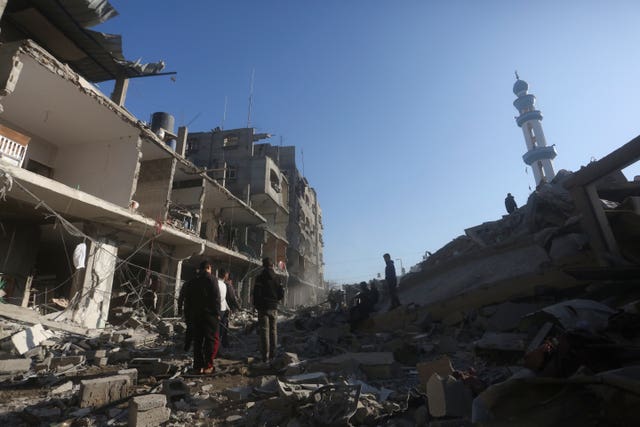
Israel’s response to the Hamas attack is beyond what is “necessary and proportionate”, Ireland has told the UN’s top court.
Ireland also told the International Court of Justice that Israel is annexing Palestinian territory and has prevented Palestinian people from exercising their rights to self-determination.
It further said that states are obliged not to assist in maintaining “Israel’s serious breach” of the rights of Palestinian people.
Ireland was contributing to a hearing at the ICJ on request for an advisory opinion on the case of Israel’s policies and practices in Occupied Palestinian Territory (OPT).
Speaking in The Hague, Irish attorney general Rossa Fanning first said Ireland’s Government had “profound concern” about background to the hearing.
He said the Hamas attacks on October 7 were “reprehensible”.
He said: “We have condemned them unequivocally, the rape and murder of civilians, destruction of civilian property, the taking of hostages, the use of human shields and the firing of indiscriminate rockets at urban centres constitutes serious violations of international humanitarian law for which those involved must be held accountable.”
However, Mr Fanning said international law limits the use of force in self defence to “no more than what is necessary and proportionate”.

He added: “Ireland’s view is that these limits have been exceeded by Israel in its military response to the Hamas attack.
“This is manifest from the spiralling death toll, the extensive destruction of property including homes throughout Gaza, the displacement of up to two million people and the ensuing humanitarian catastrophe.”
Mr Fanning noted that Ireland has repeatedly called for a ceasefire, adding that Ireland supports a comprehensive two-state solution.
Additionally, the attorney general said Israel is annexing Palestinian territory in the West Bank.
“In Ireland’s view, Israel is already engaged in the process of annexing Palestinian territory. It is doing so de facto through its policy of encouraging demographic change in that territory by population transfer, and by the continuous development and maintenance of permanent settlements and infrastructure.
“Ireland is concerned that it may also be doing so de jure by increasingly extending the application of domestic Israeli law and civilian administration to the settlements in the OPT, thereby integrating them into its own territory and erasing the differences in law between Israel and the settlements.”
Mr Fanning said Israeli settlers had continued to unlawfully destroy and appropriate property throughout the OPT, and that Israel had a policy of encouraging and facilitating the expansion of settlements.
He said this was a clear breach of international law and the Geneva Convention.

Ireland also accused Israel of preventing Palestinian people from exercising their rights to self-determination.
Mr Fanning said Israel’s prolonged occupation of the OPT has “increasingly fragmented Palestinian presence” and use of their land and resources.
“It threatens the viability of a future Palestinian state. The nature, scale and duration of settlement activist is such that its purpose can only be to permanently obstruct the exercise of the Palestinian people’s rights to self determination.”
Mr Fanning added: “Ireland has, with regret, concluded that by its prolonged occupation of Palestinian territory and the settlement activities it has conducted there for more than half a century, Israel has committed serious breaches of a number peremptory norms of general international law.”
Ireland said states are obliged to co-operate to bring an end to “Israel’s serious breach” of its duty to respect the rights of Palestinian people.
Mr Fanning said this meant that states are obliged not to render aid or assistance in maintaining this situation.
He said it was Ireland’s view that all states are required to review trading relationships with settlements in the OPT, requiring them to take steps to prevent trade which maintains settlement activity or implicitly legitimises Israel’s annexation of that territory.
Mr Fanning also told the International Court of Justice that Israel’s military occupation of the OPT since 1967 has involved extensive, permanent and deliberate settlement building.
He said: “Neither the duration of the occupation nor the scale and extent of settlement activity is, in Ireland’s view, justified or permitted by the law regulating the use of force in self defence.
“Indeed, if the security of one people can only be achieved by the occupation over so many decades of the territory of another people, one has to wonder whether there can be any military solution to the problem that it purports to address.
“In our view, the only effective solution to the problem can be a political one.”

Enjoy the convenience of having The Sunday Post delivered as a digital ePaper straight to your smartphone, tablet or computer.
Subscribe for only £5.49 a month and enjoy all the benefits of the printed paper as a digital replica.
Subscribe